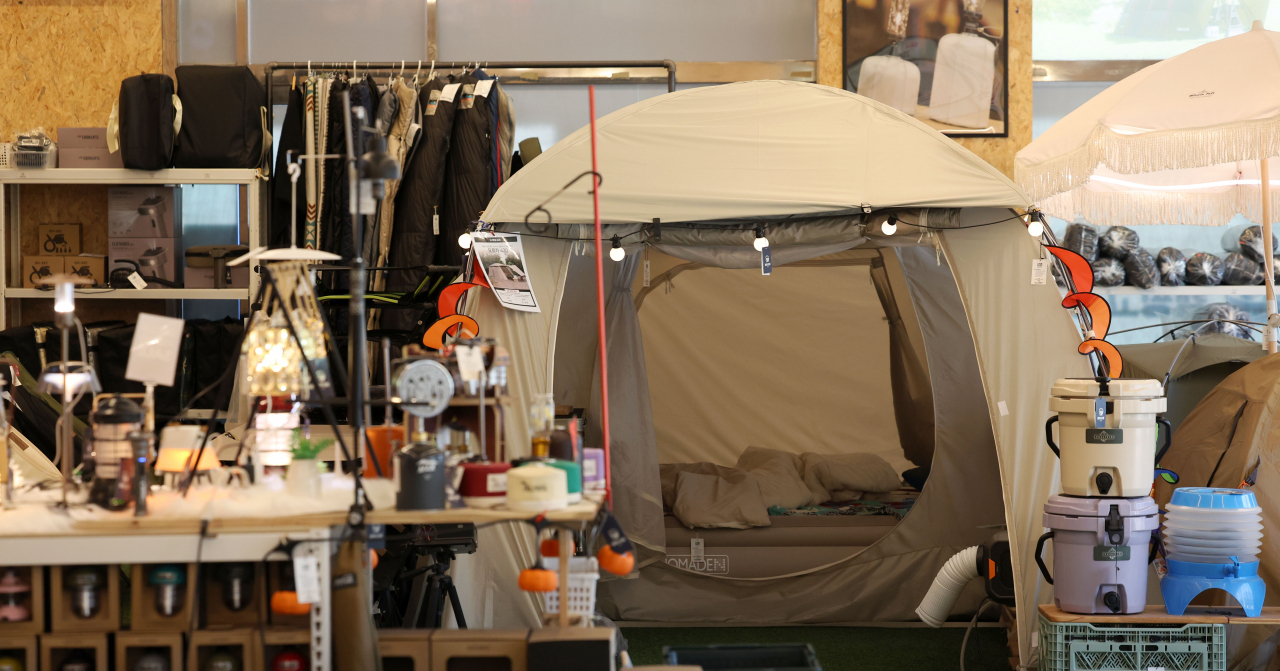 |
Camping equipment for sale at a camping store in Seoul, Nov. 13, 2023. (Newsis) |
“This is not a campsite,” reads a banner that hangs prominently -- yet seemingly powerlessly -- in a public parking lot at the port of a small island off the city of Sacheon, South Gyeongsang Province.
After gaining social media fame as a haven for fishing and camping, the island of Neokdo’s usually quiet fishing villages are grappling with visitors in camping cars and tents overstaying their welcome. Often they occupy prime spots in public space, leaving them mostly unattended, only to use them when they can, such as on weekends.
Campers becoming a nuisance to local villagers is not uncommon in South Korea now, since outdoor leisure has become a widespread pastime, particularly after the COVID-19 pandemic broke out.
It is estimated that Korea has nearly 5 million campers now, with the number of campsite operators nearly tripling from the pre-pandemic tally in 2019 to a record high of 3,600 as of September this year, according to data from the Korea Tourism Association.
The growing popularity of camping activities, however, is leading to concerns that there is a lack of campground etiquette and safety awareness from some of the country’s campers.
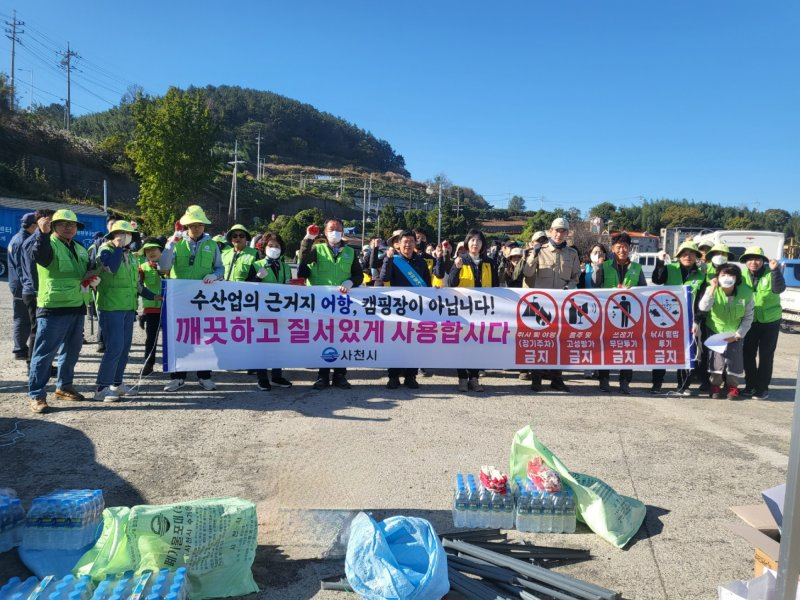 |
Local residents and officials from an environmental organization pose for a photo at Neukdo port in Sacheon City, South Gyeongsang Province, Nov. 12, 2023. (Courtesy of Sacheon City Hall) |
Space-hogging tents
This space-hogging type of selfishness has become a contentious issue among campers, local residents and the broader public.
Referred to as "albakgi" in Korean, this practice involves setting up tents and camping cars to reserve prime spots for themselves. These spaces, however, often remain unused until the owners actually visit, rendering them unavailable to potential new users in the meantime.
In June this year, the Ministry of Oceans and Fisheries revised the Act on the Use and Management of Bathing Beaches to establish and streamline administrative measures for regulating unattended tents, camping-related vehicles and equipment on beaches.
However, beyond beach areas, unethical campers can continue to anchor their tents for long periods at campgrounds or public parking spaces.
Campsites, parking lots, roadsides and beaches in Korea can be either public or privately owned, but public spaces are usually free for anyone to use.
An allegedly retaliatory crime occurred this summer at a Cheongdo-gun campsite in North Gyeongsang Province, where more than 20 alleged albakgi tents were marked with knife slashes by an unidentified individual. In response to this incident, many online community users sided with the perpetrator, denouncing the campers who had left their tents at campsites for an indefinite amount of time.
One comment reads, "Damaging others' property is not commendable, but it's satisfying to see those campers get schooled."
Kim Se-il, an official from the community service welfare team at the Cheongdo-gun county office, highlighted practical hindrances in breaking the current impasse.
“As free campsites are vital for attracting tourists to the region, removing overstaying tents without the owners' consent, in part, clashes with the municipal government’s attempt to boost local tourism,” he said.
Moreover, there is generally a lack of legal basis for clearing out these encampments, he added.
“As part of efforts to prevent long-term pitched tents, we mostly put up banners and give them verbal warnings,” he explained, adding, “Some municipal governments have their own ordinance, which grants legal action to oust albakgi tents, but in reality, most local governments are deprived of this type of legal force.”
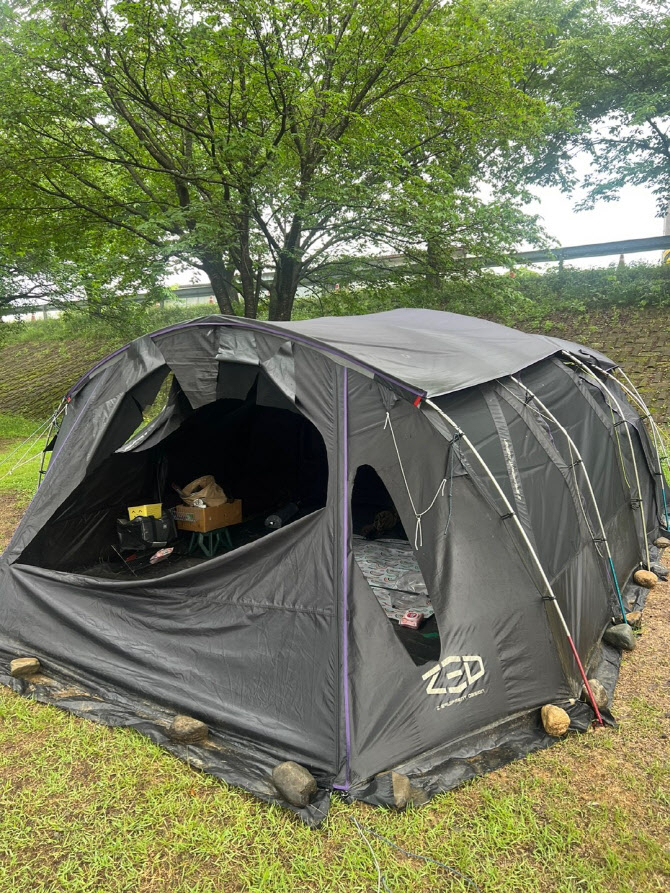 |
A ripped tent is seen at a campsite Cheongdo-gun, North Gyeongsang Province. (Courtesy of online community) |
In the port city of Incheon, public parking lots along the Gyeongin Ara Waterway are filled with camping trailers, campervans and recreational vehicles parked from who knows when. Some owners seem to treat this public space as their private property, hindering other cars from parking.
Although this problem has persisted for years, the city government faces a deadlock as vehicles in public parking areas are not subject to towing.
Complaints from parking lot users have accumulated over the years due to the inconvenience caused by camping caravans parked there long-term. One anonymous commenter in a Naver online community likened a particular parking lot to an exhibition of camping vehicles, stating, "If you actually go there, it's a sight to behold."
In Incheon, to tackle the issue, the city government there plans to convert free parking spaces into paid zones, in an attempt to hold vehicle owners financially accountable.
One official from the Incheon Metropolitan City government expressed hope that this financial approach would produce the desired results.
“Most of the camping car owners will either leave or pay,” he said, while lamenting, “but such measures wouldn't be necessary if inconsiderate individuals didn't park their camping vehicles, cook and litter in public areas.
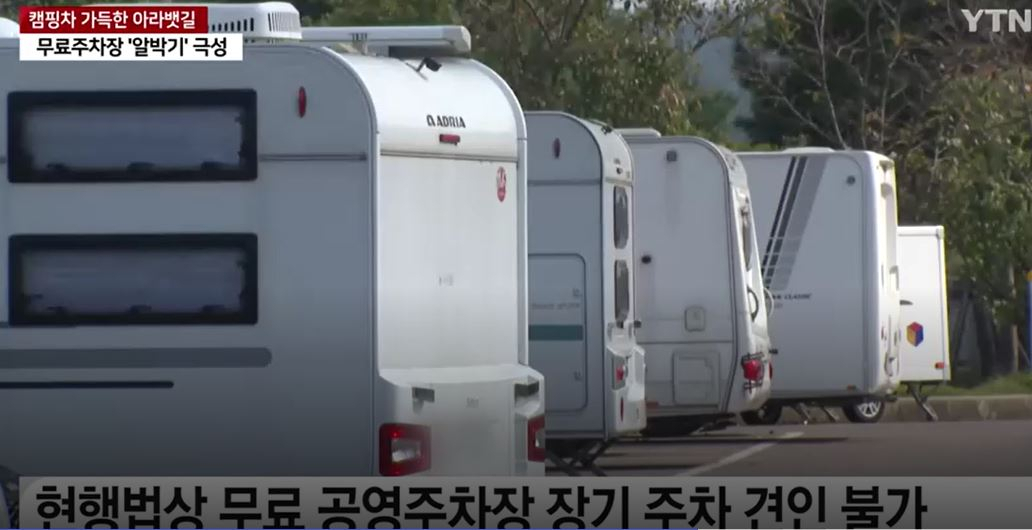 |
Camping vehicles are parked in a public parking lot near the Gyeongin Ara Waterway in the port city of Incheon (Screenshot from YTN) |
Winter camping perils
As local governments have been contending with a rise in unethical campers, the seasonal transition to winter presents serious health risks for outdoor enthusiasts.
Indeed, an enjoyable aspect of camping in winter might lie in braving the frosty outdoor environment while snuggling up for warmth indoors.
Yet, as much as it is crucial to stay warm in cold weather, fuel-burning camping equipment like camp stoves, heaters and grills, which are designed to provide heat and warmth, must be handled with care and proper knowledge, as they emit carbon monoxide, an odorless but lethal gas.
In South Korea, there have recently been a series of fatal accidents involving carbon monoxide poisoning at camping sites.
According to the Chungbuk Fire Service Headquarters, a married couple in their 60s and their grandson were discovered dead in an enclosed tent on Nov. 12 in Yeongdong-gun, North Chungcheong Province.
Inferring from the presence of burned charcoal in an enclosed space, authorities suspected that carbon monoxide poisoning was the likely cause of their deaths.
The buildup of this invisible and insidious gas can be deadly, especially in cold weather. In data released by the National Fire Agency, of a total of 471 reported cases of carbon monoxide poisoning over a three-year period from 2019 to 2021, 401 incidents occurred between October and March. Accidental carbon monoxide poisonings at campsites accounted for 123 cases, representing over a quarter of the total accidents.
The Ministry of Culture, Sports and Tourism and the Korea Tourism Organization are making concerted efforts to tackle health issues associated with carbon monoxide poisoning. They intend to conduct safety education programs in December for campsite operators and responsible government officials. The programs aim to enhance safety regulations, implement preventive measures for various kinds of camping accidents and provide first-aid training for emergencies.
Individual awareness of the potential dangers regarding using camping equipment must also be a prerequisite.
Lee Young-ju, a fire safety professor at Kyungil University, cautioned against the burning of fuels like coal and wood inside poorly-ventilated tents or camping vehicles.
"Campers should prioritize proper ventilation when using fuel-burning equipment for heating inside tents," he advised. "The use of electric heaters is recommended as they do not produce carbon monoxide fumes. However, it's crucial to be aware of the relevant safety measures, such as avoiding overloading outlets, to prevent heaters from overheating and potentially causing a fire."
While having a carbon monoxide detector helps prevent accidents, it's important not to rely solely on it, as it may malfunction or one might not hear it when asleep, he added.
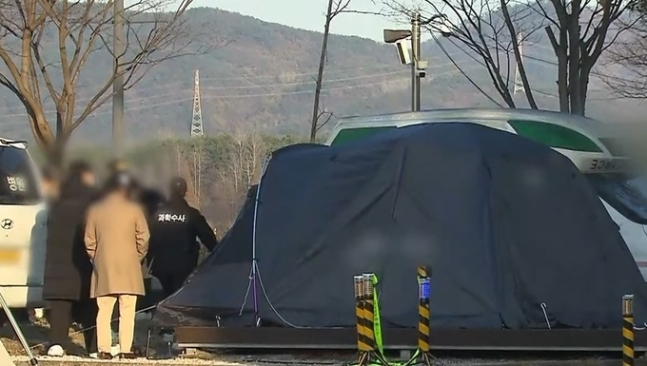 |
A married couple in their 50s and their grandson were found dead in a tent in Yeoju Gyeonggi Province, Nov. 11, 2023. Police authorities suspect they likely died from carbon monoxide poisoning. (Screenshot from SBS) |







![[Herald Interview] How Gopizza got big in India](http://res.heraldm.com/phpwas/restmb_idxmake.php?idx=644&simg=/content/image/2024/11/20/20241120050057_0.jpg)